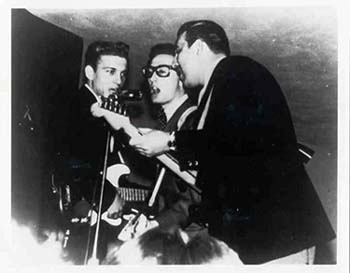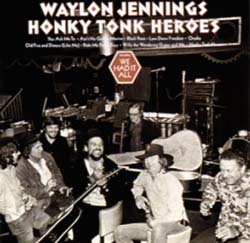|
Nashville never knew
what to do with him or what to do about him. This
one-time, disc-jockey refugee and bass player of Buddy
Holly’s band who gave up his seat on that fateful
plane ride to J.P. Richardson, the Big Bopper. He’d
been in Nashville for almost ten years occasionally recording
great songs like "Just To Satisfy You" and "Only Daddy
That’ll Walk The Line," sometimes hitting the charts
but basically going nowhere recording lots of what can
charitably be called product until they let him do what
he wanted. And he had to fight to do it. Even then it
took that whole "Outlaw" thing to really get him noticed.
It was bullshit of course. As Jennings said, "It was a
good marketing tool." Or as George Jones told me at the
time, "I think that’s just people talkin’ when
they call it the Outlaw Movement or Progressive Country.
I just think that’s people that love to dream up
things and talk. Country music is country music."
Waylon Jennings, now that
he’s gone, will forever be known as a country singer
and he could sing country. He probably could’ve sung
anything and sometimes did. What he really was however
was a rocker disguised as a country singer. His best albums,
a remarkable series of records starting with Lonesome
On’ry & Mean in 1973 and continuing for the
rest of that decade proves it. Whatever that magical thing
is that makes certain singers great, Waylon had it to
spare. He knew what he was singing about and sang with
a quiet yet simmering intensity few possess. There was
a soulful desperation in his voice that could draw you
in and make you listen for hours. In his voice and also
in his great band, The Waylors, was a restrained energy
that threatened to explode but never did and it worked
because the threat was enough.
Jennings was a master at
slow ballads, such as "We Had It All" or Willie Nelson’s,
"It’s Not Supposed To Be That Way." He had brilliant
dynamics and an understanding of tension that could make
an otherwise mundane line in a song totally dramatic.
The second side of his album This Time is all slow
ballads and he holds your attention for every second.
 |
Even though in the country
world he was a big star with 16 number one hits, I always
felt he should’ve been bigger. For whatever reason
he never really caught on with the audience attuned to
"roots rock." Those who knew about him knew about him
and it pretty much stayed that way his entire career.
Jennings didn’t help matters with his somewhat legendary
drug use and by the early ’80s when he should have
been at the peak of his powers he began to fade artistically.
His voice seemed weaker and it was obvious that he cared
less about his albums leaning more towards songs that
would continue to perpetuate his outlaw image instead
of finding worthwhile material.
I only saw him perform
a few times. Country music never really caught on in Philadelphia
and only those artists who crossed over such as Willie
Nelson would play the area frequently. The best time was
in the mid-seventies when he appeared at the usually folk
coffeehouse, the Main Point in the suburb of Bryn Mawr.
Though Jennings later mentioned the show in a song, there
weren’t many people in attendance, maybe 20 or 30,
plus the members of Asleep at the Wheel who were appearing
there the following night. The band was the classic version
of the Waylors with Jennings' long-time drummer, Richie
Albright, Donnie Brooks on harp and one of the true legends
of the pedal steel, Ralph Mooney. Jennings, who was a
big man, came out with his famous leather-coated Telecaster
and proceeded to eye every woman in the place as he sang.
He performed as if the small audience was in the hundreds,
blowing minds with his trademark "chicken pickin’"
lead guitar work. One of the most unacknowledged things
about Waylon Jennings is that he was one of the great
lead guitar players. The man not only knew what twang
was all about, but he was funky, a Texas kind of funky.
 |
About 12 years later I
saw him again at a place that was usually a disco, again
in the suburbs. (I don’t think Waylon Jennings ever
performed within the city limits of Philadelphia.) His
band was nowhere as good, with the keyboard player synthesizing
the harmonica parts and the man on stage seemed a pale
imitation of the one I’d seen before, dwelling more
on the personae than the music.
In recent years, though
he was plagued by illness—he couldn’t even walk
on stage—he seemed revitalized and paying attention
to the music. His albums started getting good reviews
after years of mostly negative ones. He started doing
new material including Dylan’s "Things Have Changed."
In 1993, RCA released a
two-CD set, Only Daddy That’ll Walk The Line—The
RCA Years that didn’t tell the whole story, leaving
off some of his greatest songs. His masterpiece remains
his album Honky Tonk Heroes which consists entirely
of classic Billie Joe Shaver-penned songs except for the
emotional closer, "We Had It All,"—perhaps Jennings'
finest rendering of a ballad. On this and other albums
recorded around that period such as Lonesome On’ry
& Mean, This Time, Ramblin’ Man
and Dreaming My Dreams you’ll find out why
Waylon Jennings was not only a great country singer, but
one of the great singers.
Related Stories:
Are
There Any More Real Cowboys?
Interviews
with Waylon Jennings and Willie Nelson.
By Jayson Whitehead
Nov '98
Just
A Good Ol' Boy:
Waylon Jennings
talks about Buddy Holly.
By Jayson Whitehead
Feb
'99
|